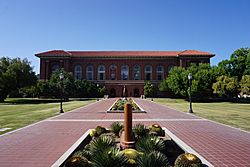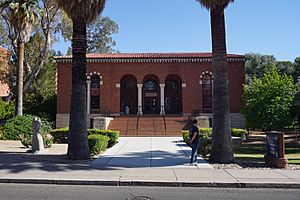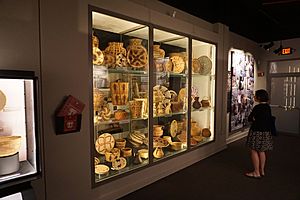Arizona State Museum facts for kids

The north building of the Arizona State Museum.
|
|
| Established | 1893 |
|---|---|
| Location | Tucson, Arizona |
| Type | Archaeological, anthropological |
| Owner | University of Arizona |
The Arizona State Museum (ASM) is the oldest and largest museum of its kind in the region. Founded in 1893, its main job was to protect and store important archaeological items. Today, the museum still stores these artifacts, but it also shows them in exhibits and offers chances for education and research.
The museum is run by the University of Arizona and is located on the university's campus in Tucson. It is also an affiliate of the famous Smithsonian Institution.
Contents
History of the Museum
For thousands of years, Native peoples have lived in North America. The Arizona State Museum studies the homes, daily lives, art, and ways of communicating of the people who lived in the American Southwest.
Museum experts explore ancient archaeological sites to learn how people lived long ago. They uncover clues about what they ate, what they wore, and how they created beautiful art. Many of the homes and villages these people built have crumbled or been worn away by nature over time, so this work is very important.
One of the museum's most important early directors was Emil W. Haury. He led many archaeological digs in the Southwest. He also taught students and the public about his amazing discoveries and the methods he used to find them.
Amazing Collections
The Arizona State Museum is home to incredible artifacts from both past and present cultures. These items include things like pottery, jewelry, baskets, textiles, and clothing.
- Archaeological Items: These are objects that were dug up from the ground during excavations by museum staff and other archaeologists.
- Ethnological Items: These are objects that were not found underground. Many were given to the museum by Native American tribes or other individuals. Some were also purchased by the museum.
The museum also has a huge photo collection with over 350,000 pictures. These photos show the history of Native peoples in the American Southwest and northern Mexico. Famous photographers like Forman Hanna and Emil Haury have their work in this collection.
Protecting the Pottery
The museum takes great care of its artifacts. Each item must be kept in a special area to protect it from humidity, heat, and insects. The ASM has the world's largest collection of pottery from the Southwest. It is stored in a modern vault to protect the 20,000 pots and vessels from damage.
Exhibits and Programs
The museum always has interesting objects from its collections on display. The exhibits celebrate the ancient and living Native cultures of the area. You can see a list of current and upcoming exhibits on the museum's website.
Besides exhibits, the museum offers many public programs for visitors of all ages. These include:
- School programs
- Lectures from experts
- Hands-on activities and workshops
- Travel tours
Learning and Research
The museum is a great place for students of archaeology, anthropology, and art. They work with the museum staff to learn about the materials and techniques used to create the objects in the collections. Some students even get to join the museum's archaeological digs.
The museum also has special offices and resources for researchers:
- Office of Ethnohistorical Research (OER): This office studies the history of people in the Southwest and northern Mexico. Its library has over 8,000 sources of information, including old Spanish and Mexican documents.
- AZSITE: This is a computer database of cultural sites and surveys in Arizona. It helps researchers find information about hundreds of sites without having to travel to each one.
- Library and Archives: The museum's library is open to the public for research. It has over 100,000 books and journals about the archaeology and cultures of the Southwest. The archives contain maps, letters, field notes, and oral histories.
Working with Native American Tribes
The Arizona State Museum has a strong relationship with Native American tribes throughout the Southwest. Museum staff often visit tribal communities. Also, tribal members visit the museum to help identify and share information about objects in the collection.
The museum also follows state and federal laws. This includes working with tribes on important issues related to their ancestors and cultural items.
Museum Directors
The museum has had seven directors since it was founded:
- Byron Cummings (1915–1938)
- Emil W. Haury (1938–1964)
- Raymond H. Thompson (1964–1998)
- George J. Gumerman (1998–2002)
- Hartman H. Lomawaima (2002–2008)
- Beth Grindell (2008-2013)
- Patrick D. Lyons (2013-present)
See also
 In Spanish: Museo Estatal de Arizona para niños
In Spanish: Museo Estatal de Arizona para niños
 | Chris Smalls |
 | Fred Hampton |
 | Ralph Abernathy |



